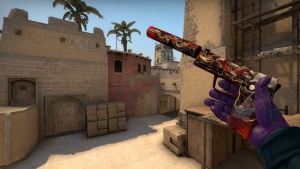Gambling in Video Games
With the rise of using unlockable content as sources of income for the modern video game market, many modern video games have adopted a monetary system where players can acquire cosmetic game content in the form of texture redesigns for in-game items typically called “skins." [1] Often through some form of loot box with variable odds for random items, players can acquire different skins to customize how various items in their chosen game appear. [2] Loot boxes are typically purchased with real money on their own or by the buying of keys to open them. [3] However, certain games also allow the player to unlock forms of loot boxes with experience points which can be acquired through the continual playing of the game. [4] Some games also allow users to unlock skin content through using real-life money directly or purchasing game-specific currency that can be used in a similar fashion. These types of transactions are typically referred to as in-game micro-transactions. [5]
After acquiring these skins, players can then choose to use these skins instead of the default textures that the game presents to them. How skins can change the appearance of the game can vary from changes in clothing to avatars and even weapon camouflages in first-person shooter games. These skins can be purely cosmetic and provide no in-game utility to the player or allow the player to more easily advance in the game. [6] However, players typically aim to acquire skins of a higher rarity because of their low drop rates. [7] The acquisition of these skins through loot boxes has led to debates about them being a gateway to more traditional forms of gambling. [8] Similar to other casino games like slots and roulette, the player pays to get a random chance of potentially winning and profiting from their down payment or losing it all. Ethical implications regarding underage gambling and gambling addiction have also been growing concerns with the fewer amounts of gambling regulations in the gaming industry. [9]
Contents
Virtual Currency and Marketplaces
Along with the rise of skins within game systems, game-centered markets have also been formed to further monetize how players can interact with skins. One of these marketplaces has been the Steam community market. In this marketplace, players can create listings for their cosmetic skins and also buy skins from other players. These transactions create value for each individual skin, often based on their popularity and variety. The values of these skins can range from pennies to thousands of dollars. [10] In this form, skins are a form of virtual currency that players collect and exchange with each other.
Beginnings
In 2012, video company Valve introduced skins to their popular titles of Team Fortress 2 and Counter-Strike Global Offensive. These skins were added in an attempt to increase player engagement, and along with the addition of their community marketplace, they were immensely sought after by a variety of players. [11] In Team Fortress 2, these skins took the form of cosmetic hats and clothing that the characters could wear, and in Counter-Strike Global Offensive, they were brightly colored weapon camouflages. Along with their unique designs that appealed to their player bases, Valve assigned specific rarity values to each skin added into the games that determined the probability that a player would be able to unlock the item through a loot box. [12] These loot boxes could be randomly received through playing the game. However, the player would have to use real money to purchase the keys to unlock them. After using a key with a crate, it would consume both items to unlock a random skin.
As games have continued to develop from their early era, the use of loot boxes to acquire various in-game items including skins has become increasingly commonplace. A study conducted in 2020 on the presence of loot boxes in mobile games on both Android and Apple platforms as well as in desktop games on popular gaming platform Steam showed that 58% of top-grossing Android games, 59% of top-grossing Apple games, and 36% of the most popular games on Steam contained a form of a loot box. [13]
Loot boxes
Loot boxes are virtual item crates that can be obtained and opened by players to redeem a random in-game item. Many games offer these loot boxes as free-to-play rewards for playing the game. However, players can also often purchase these loot boxes with in-game currencies or external funds. With slight variation between different games, these boxes can typically be opened immediately after retrieving them or through forms of digital keys that players can purchase separately for real money. [14] After unlocking each box, it will be consumed and the player will receive a random item from the game. Often each unique item that can be obtained has a different category of rarity, which largely determines its drop rate. The rarest items are generally the ones with the lowest probability of dropping. [15] Much similar to more conventional gambling methods, there is a chance that a player may win big or lose out on their investment. Many popular titles in current video games include loot boxes as a form of obtaining different loot including Star Wars Battlefront 2, Overwatch, Injustice 2, For Honor, FIFA Ultimate Team, and more. [16] [17]
Controversy on gambling status
There has been debate on whether loot boxes should be categorized under gambling, largely because of a loot box's aspect of certainty. Figures from the video game industry have argued that because a player is guaranteed an item from opening a loot box, it does not align itself with definitions of gambling. [18] However, with its potential for monetary exchange, an unknown future outcome, chance determining at least part of the outcome, avoidance preventing loss, winners gaining at the expense of losers, and the ability for many games to cash out rewards, others argue that loot boxes are forms of gambling equal to conventional methods. [19] This grey area on the status of gambling results in varied levels of gambling regulations on loot boxes. Some countries such as China and Japan view loot boxes as inherent forms of gambling and have imposed regulations whereas other countries still have not fully considered where loot boxes fall on the spectrum of gambling. [20]
Esports betting
Stemming from the growing popularity of the competitive esports industry, esports betting has become a popular form of digital gambling within video games since the rise of Twitch and streaming platforms in 2011. [21] Established sports gambling platforms have created opportunities to wager on the results of esports games and its growth has opened the door for new platforms to enter the field of video game gambling as well. [22] Online websites with little regulation allow players to trade in their skins on their websites to be used to place bets on the results of esports games.[23] If an individual successfully places a bet on the winning team, then they receive a percentage of their betting value in return depending on the favorable odds of the game as predicted by the community. Placing a bet on the wrong team would mean that the individual would lose their bet entirely. These websites for esports betting are especially prevalent for games like Counter-Strike Global Offensive, Dota 2, and PUBG where the skins can be cashed out for real money.[24] The revenue of skin betting was estimated to be $56 billion in 2016. However, steps made by game developers on regulating betting on third-party platforms have decreased annual revenues to $670 million. [25]
Match-fixing scandals
The introduction of skin betting brought to light scandals around esports betting through match-fixing.[26] Match-fixing is the purposeful losing of a game with intent for profit. There have been a few cases of professional esports teams being exposed for partaking in match-fixing. In 2014, a Counter-Strike Global Offensive team named iBUYPOWER was discovered to have wagered against themselves in a tournament match using an esport skin betting platform. Following the scandal, the players were banned from competing in future tournaments.[27] In StarCraft 2, a number of high-profile teams were exposed to have partaken in match-fixing, leading to the closing of its long instantiated ProLeague in 2016. [28]
Third-party skin gambling websites
Over the years, third-party gambling websites where players can gamble their in-game skins have also gained popularity among gamers. Players can deposit their skins and choose a variety of traditional casino games to play in an attempt to gain winnings. Some of these games include roulette, coin flip, jackpot, and case opening. Played in a similar fashion to their original form, the main distinction between these online platforms and their typical rules is the use of skins as currency rather than direct forms of cash. [29] These websites gained massive popularity in 2016 with an estimated $5 billion dollars being used to gamble with skins. [30]
CSGO Lotto controversy
In the spring of 2016, CSGO Lotto became a popular gambling website for the game Counter-Strike Global Offensive. In design, it was closely similar to many of the other gambling platforms that had developed in recent years. However, a large part of its success was its highlighted exposure to the public through online public figures playing the gambling site on YouTube. Following an investigation by YouTuber HonorTheCall, Trevor Martin and Tom Cassel, also referred to as their online alias of TmarTn and Syndicate, were discovered to have been owners of the website despite not revealing this information to the public[31] The two YouTubers had previously made countless videos on the website where they would win thousands of dollars. Pretending as if they were typical individuals gambling on the site rather than the owners themselves, a controversy around these individuals, as well as skin gambling websites, arose because of the potential for these YouTuber's audiences to be influenced to also partake in the same gambling activities. [32]
Ethical Implications
Underage Gamblings
As these games are marketed to younger generations, both in-game gambling methods like loot boxes as well as other third-party gambling websites bring out ethical concerns about underage gambling. As skins are not considered to be actual money being gambled, there are no government laws in place that prevent younger individuals from partaking in these gambling-like activities. [33] Underage minors can freely partake in these gambling activities without a complete understanding of the system. Experts state that this is even more concerning as peer pressure to obtain rare skins may influence younger individuals even more into partaking in these activities. However, over the years, certain measures have been established to control the digital gambling of skins such as blocking certain sites and establishing age requirements. [34] However, the presence of loot box gambling still remains prevalent within major games.
References
- ↑ https://www.sciencedirect.com/science/article/pii/S0747563222000413?casa_token=F5C9nqsULswAAAAA:3gSkXrF3Wd4qjqV-5t-b9GEX9hFWL2lGGvKVxiHFuoDtczGM53ycXcWR948c9hFk6fWYmi0zxA#bib31
- ↑ https://onlinelibrary.wiley.com/doi/full/10.1111/add.14973?casa_token=Ih0mMbUMTGMAAAAA%3AckR5WHGMJ2DWxDY_HaMPhVEBE0iJHVJ_0vcpFIOzgX4GYXpQi5fJsyHwIAihmIWAon_Gn6IXOQq1s8aO
- ↑ https://www.liebertpub.com/doi/full/10.1089/glr2.2018.2216
- ↑ https://www.sciencedirect.com/science/article/pii/S0747563222000413?casa_token=F5C9nqsULswAAAAA:3gSkXrF3Wd4qjqV-5t-b9GEX9hFWL2lGGvKVxiHFuoDtczGM53ycXcWR948c9hFk6fWYmi0zxA#bib31
- ↑ https://www.sciencedirect.com/science/article/pii/S0747563222000413?casa_token=F5C9nqsULswAAAAA:3gSkXrF3Wd4qjqV-5t-b9GEX9hFWL2lGGvKVxiHFuoDtczGM53ycXcWR948c9hFk6fWYmi0zxA#bib31
- ↑ https://www.liebertpub.com/doi/full/10.1089/glr2.2018.2216
- ↑ https://www.liebertpub.com/doi/full/10.1089/glr2.2018.2216
- ↑ https://onlinelibrary.wiley.com/doi/full/10.1111/add.14973?casa_token=Ih0mMbUMTGMAAAAA%3AckR5WHGMJ2DWxDY_HaMPhVEBE0iJHVJ_0vcpFIOzgX4GYXpQi5fJsyHwIAihmIWAon_Gn6IXOQq1s8aO#add14973-bib-0001
- ↑ https://www.sciencedirect.com/science/article/pii/S0747563222000413?casa_token=F5C9nqsULswAAAAA:3gSkXrF3Wd4qjqV-5t-b9GEX9hFWL2lGGvKVxiHFuoDtczGM53ycXcWR948c9hFk6fWYmi0zxA#bib31
- ↑ https://steamcommunity.com/market/search?appid=730#p1_price_desc
- ↑ https://en.wikipedia.org/wiki/Skin_gambling
- ↑ https://counterstrike.fandom.com/wiki/Skins#Skin_Quality:
- ↑ https://onlinelibrary.wiley.com/doi/full/10.1111/add.14973?casa_token=Ih0mMbUMTGMAAAAA%3AckR5WHGMJ2DWxDY_HaMPhVEBE0iJHVJ_0vcpFIOzgX4GYXpQi5fJsyHwIAihmIWAon_Gn6IXOQq1s8aO#add14973-bib-0001
- ↑ https://www.liebertpub.com/doi/full/10.1089/glr2.2018.2216
- ↑ https://www.liebertpub.com/doi/full/10.1089/glr2.2018.2216
- ↑ https://www.liebertpub.com/doi/full/10.1089/glr2.2018.2216
- ↑ http://www.tascl.org/uploads/4/9/3/3/49339445/drummond_sauer_nhb_2018_loot_boxes.pdf
- ↑ https://www.liebertpub.com/doi/full/10.1089/glr2.2018.2216
- ↑ http://www.tascl.org/uploads/4/9/3/3/49339445/drummond_sauer_nhb_2018_loot_boxes.pdf
- ↑ https://www.liebertpub.com/doi/full/10.1089/glr2.2018.2216
- ↑ https://jgi.camh.net/jgi/index.php/jgi/article/view/4059/4471
- ↑ https://jgi.camh.net/jgi/index.php/jgi/article/view/4059/4471
- ↑ https://jgi.camh.net/jgi/index.php/jgi/article/view/4059/4471
- ↑ https://jgi.camh.net/jgi/index.php/jgi/article/view/4059/4471
- ↑ https://www.thelines.com/wp-content/uploads/2018/03/Esports-and-Gambling.pdf
- ↑ https://www.tandfonline.com/doi/full/10.1080/14459795.2018.1558451?casa_token=a7UaqkCnMOwAAAAA%3AXvlN-REr9mw5mBdY7D4AGDwffHCo9XokEz5nWpAHL8H5-bMARrqKEJab3NBnT-DtLhpQCwhr5N2ljw
- ↑ https://www.tandfonline.com/doi/full/10.1080/14459795.2018.1558451?casa_token=a7UaqkCnMOwAAAAA%3AXvlN-REr9mw5mBdY7D4AGDwffHCo9XokEz5nWpAHL8H5-bMARrqKEJab3NBnT-DtLhpQCwhr5N2ljw
- ↑ https://www.tandfonline.com/doi/full/10.1080/14459795.2018.1558451?casa_token=a7UaqkCnMOwAAAAA%3AXvlN-REr9mw5mBdY7D4AGDwffHCo9XokEz5nWpAHL8H5-bMARrqKEJab3NBnT-DtLhpQCwhr5N2ljw
- ↑ View of Esports Betting and Skin Gambling: A Brief History. (2022). Camh.net. https://jgi.camh.net/jgi/index.php/jgi/article/view/4059/4471
- ↑ How Counter-Strike spawned a $5 billion gambling market you’ve never heard of. (2015). ESPN.com. https://www.espn.com/espn/feature/story/_/id/18510975/how-counter-strike-turned-teenager-compulsive-gambler
- ↑ How Counter-Strike spawned a $5 billion gambling market you’ve never heard of. (2015). ESPN.com. https://www.espn.com/espn/feature/story/_/id/18510975/how-counter-strike-turned-teenager-compulsive-gambler
- ↑ How Counter-Strike spawned a $5 billion gambling market you’ve never heard of. (2015). ESPN.com. https://www.espn.com/espn/feature/story/_/id/18510975/how-counter-strike-turned-teenager-compulsive-gambler
- ↑ Skin betting and video games. What are they and how does it work. (2019, May 2). Videogames.org.au. https://www.videogames.org.au/skin-betting/
- ↑ Wikipedia Contributors. (2022, January 15). Skin gambling. Wikipedia; Wikimedia Foundation. https://en.wikipedia.org/wiki/Skin_gambling

